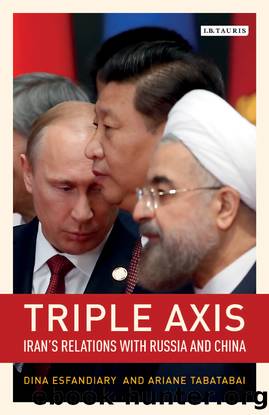Triple-Axis: Iran's Relations With Russia and China (Library of International Relations Book 86) by Ariane Tabatabai & Dina Esfandiary

Author:Ariane Tabatabai & Dina Esfandiary [Tabatabai, Ariane & Esfandiary, Dina]
Language: eng
Format: epub
Tags: International Relations, Comparative Politics, Political Science, Business & Economics, General
ISBN: 9781838609771
Google: rtuRDwAAQBAJ
Amazon: B07QG32SZV
Goodreads: 46036028
Publisher: I.B. Tauris
Published: 2018-07-30T00:00:00+00:00
Building an Army and Overcoming the Arms Embargo
Russia and China's willingness to work with Iran is important because of the arms embargo and sanctions that limit Tehran's arms procurement and defence cooperation. Following the failure of the first round of negotiations between Tehran and the Europeans on Iran's nuclear programme, the UN Security Council adopted resolution 1737 in December 2006. The resolution outlined an embargo on the export to and import from Iran of certain items and technology potentially related to nuclear weapons.42 While the resolution does not refer directly to conventional weapons, it includes missiles and other technologies that can be used for both conventional and military applications. When subsequent rounds of talks failed to produce an outcome, a 2010 UNSC Resolution expanded on the arms embargo outlined in UNSC Resolution 1737 and adopted conventional arms and ballistic missile embargoes against Iran in paragraphs 8 and 9 of the resolution.43 The resolution also provided that the embargoes would be lifted if Iran agreed to implement all measures related to previous Security Council resolutions and negotiate on its nuclear programme. As a result, the conventional and ballistic missile embargoes should have been lifted when Iran agreed to the Interim Agreement on its nuclear programme in 2013. Instead, they were maintained throughout the end of the negotiations and most importantly, in a significant concession by Iran, for another five years for the embargo on conventional weapons and eight years for the ballistic missile embargo â once the IAEA certifies that the country's nuclear programme is purely peaceful in nature.
As a result, until 2020 at the earliest, Iran's ability to purchase armaments and military gear will be subject to Security Council approval, which gives the permanent members of the Council veto power over such deals.44 While having to present the potential military sales to the Council is a nuisance, it was enough of a loophole for Russia and China to once again explore the sale of military hardware to Iran, which Tehran cannot get from any other serious providers because of its status as a pariah state. US and other unilateral sanctions on the purchase of weapons and ballistic missile parts will likely remain unless individual states decide otherwise. But once the stated five and eight years for conventional weapons and ballistic missiles respectively elapse, Iran will be free to purchase whatever military and missile kit it wants from the international market. This will likely provide a significant boost to Russian and Chinese sales of military arsenal to Iran, given their history of collaboration in this field and the existing links between their military industrial complexes, most notably with Russia. Moreover, while other states may still refrain from providing the Islamic Republic with weapons and military equipment, Russia and China have no qualms doing so. In fact, the post-JCPOA fanfare surrounding military cooperation between Iran and China, on the one hand, and Iran and Russia, on the other, suggest as much.
Download
This site does not store any files on its server. We only index and link to content provided by other sites. Please contact the content providers to delete copyright contents if any and email us, we'll remove relevant links or contents immediately.
| Bahrain | Egypt |
| Iran | Iraq |
| Israel & Palestine | Jordan |
| Kuwait | Lebanon |
| Oman | Qatar |
| Saudi Arabia | Syria |
| Turkey | United Arab Emirates |
| Yemen |
Empire of the Sikhs by Patwant Singh(23085)
The Wind in My Hair by Masih Alinejad(5095)
Rise and Kill First by Ronen Bergman(4788)
The Templars by Dan Jones(4689)
The Rape of Nanking by Iris Chang(4211)
12 Strong by Doug Stanton(3550)
Blood and Sand by Alex Von Tunzelmann(3203)
Babylon's Ark by Lawrence Anthony(2678)
The History of Jihad: From Muhammad to ISIS by Spencer Robert(2628)
No Room for Small Dreams by Shimon Peres(2368)
Inside the Middle East by Avi Melamed(2356)
The Turkish Psychedelic Explosion by Daniel Spicer(2356)
Gideon's Spies: The Secret History of the Mossad by Gordon Thomas(2351)
Arabs by Eugene Rogan(2299)
The First Muslim The Story of Muhammad by Lesley Hazleton(2271)
Come, Tell Me How You Live by Mallowan Agatha Christie(2260)
Bus on Jaffa Road by Mike Kelly(2159)
1453 by Roger Crowley(2030)
Kabul 1841-42: Battle Story by Edmund Yorke(2029)
